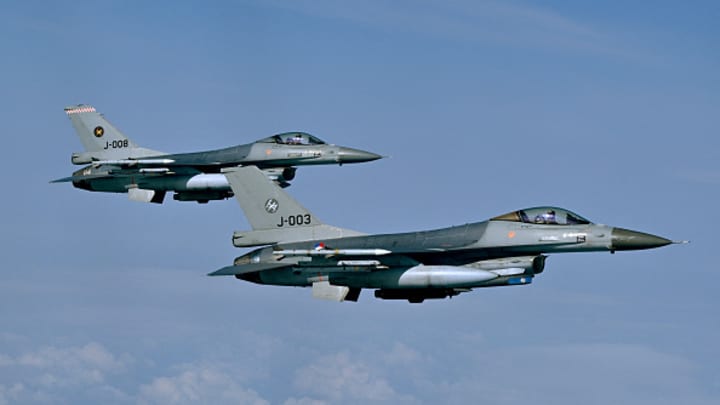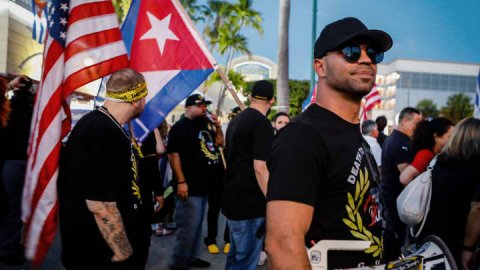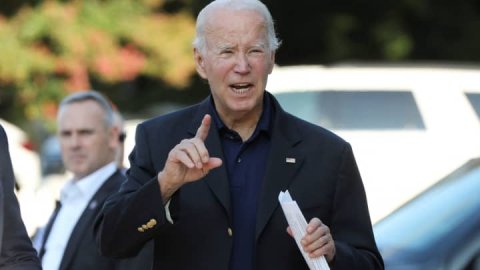
The United States has given its approval for the Netherlands and Denmark to deliver F-16s to Ukraine, officials in Washington and Europe said Friday, in a major gain for Kyiv, even though the fighter jets are unlikely to affect the war any time soon.
It was not immediately clear when the first F-16s might enter the conflict, but Ukrainian pilots will first have to undertake at least six months of training on the aircraft, according to officials.
Ukraine has long pleaded for the sophisticated fighter to give it a combat edge. It recently launched a long-anticipated counteroffensive against the Kremlin's forces without air cover, placing its troops at the mercy of Russian aviation and artillery.
Even so, Air Force Gen. James Hecker, commander of U.S. air forces in Europe and Africa, told reporters in Washington he did not expect the F-16s to be a game-changer for Ukraine. Getting F-16 squadrons ready for battle could take "four or five years," he said.
But in eastern Ukraine, attack helicopter pilots welcomed the news. They said Russia has a clear advantage in the skies, but the introduction of better fighter jets could dramatically shift the balance of power Kyiv's way.
Ukrainian air forces supporting infantry are using decades-old Soviet-era planes, which are vulnerable to air-to-air missile attacks from Russian fighter jets, Capt. Yevgen Rakita, a spokesman for the 18th Army Aviation Brigade, told The Associated Press.
"A modern war cannot be won without aviation" capabilities, Rakita said.
In making the decision on F-16 deliveries, Washington aims to ensure warplanes can be provided to Ukraine as soon as its pilots complete training, according to a U.S. administration official who was not authorized to comment and spoke to the AP on condition of anonymity.
U.S. national security adviser Jake Sullivan said U.S. Secretary of State Anthony Blinken sent a letter to his Dutch and Danish counterparts earlier this week, offering formal assurance that the U.S. would fast-track approval of all requests from third parties to transfer F-16s to Ukraine.
Danish Defense Minister Jakob Ellemann-Jensen said Friday that the training of Ukrainian pilots is starting this month.
A coalition of 11 Western countries — the Netherlands, Belgium, Canada, Denmark, Luxembourg, Norway, Poland, Portugal, Romania, Sweden and the United Kingdom — pledged in July to train Ukrainian pilots to fly F-16s.
Denmark will hand over some of its F-16s only after receiving its new F-35 jet fighters. The first four F-35s are due to be delivered on Oct. 1.
Washington's blessing for the plane donations to other countries is needed because the aircraft are made in the United States.
Ukraine's Western allies have at times moved slowly on granting Kyiv the military support it has requested.
President Joe Biden's authorization last May for allies to train Ukrainian forces on how to operate the warplanes, and eventually to provide the aircraft themselves, was preceded by months of debate in Washington and quiet talks with allies, officials said.
The administration had concerns that the move might escalate tensions with Russia. Also, U.S. officials argued that learning to fly and logistically support the advanced F-16 would be difficult.
Though delivery is likely months away, Washington says the F-16s — like the advanced U.S. Abrams tanks — will be crucial for Ukraine's long-term security.
Ukraine has been relying on older aircraft, such as Russian-made MiG-29 and Sukhoi jets. F-16s have newer technology and targeting capabilities. They are also more versatile, experts say.
In other developments:
— Russian air defenses stopped drone attacks on central Moscow and on the country's ships in the Black Sea, officials said Friday, blaming the attempted strikes on Ukraine. It was not possible to verify the claims.
— A Hong Kong-flagged cargo ship that set sail this week along a temporary Black Sea corridor established by Ukraine for merchant shipping safely reached the coast of Istanbul on Friday. The voyage was closely watched to see whether the Russian navy would allow the Joseph Schulte container vessel to pass unmolested.




